- Professional Development
- Course Listing
CRITICAL THINKING AND REASONING

Course overview
Systems Thinking
Course date
12-03-2025 to 13-03-2025
28-05-2025 to 29-05-2025
23-07-2025 to 24-07-2025
24-09-2025 to 25-09-2025
03-12-2025 to 04-12-2025
Course type
Instructor-Led
(including GST)
Member Total Fee (inc. 9% gst) : $971.19 Non-Member Total Fee (inc. 9% gst) : $1,213.17
Funding/Subsidy
Register Now
Submit an enquiry
Download Programmes Directory
Course Overview
The ability to think critically separates the effective professional from others. A person who can think fast and well has far more mental resources for higher performance than his peers who lack good thinking skills. When you are armed with critical thinking tools, many benefits inevitably follow – you are able to identify thinking flaws, differentiate between good and bad suggestions, communicate persuasively, manage difficult people or circumstances, and more.
Course benefits
Business Outcomes
Good thinking skills allow managers to improve their top and bottom-line outcomes by becoming better at problem solving, decision making and strategic planning. Critical thinking also improves productivity by saving time from “inhibiting” thinking outcomes and increases your profits through improved abilities in negotiation, persuasion and outsmarting your rivals.
Learning Outcomes
- Understand what critical thinking skills really are
- Understand rational vs. behavioral models of thought
- Understand critical thinking vs. IQ vs. creative thinking
- Identify and overcome common thinking biases and logical reasoning errors
- Apply critical thinking skills to business issues such as problem solving, decision making and strategic thinking
- Use critical thinking to enhance productivity and profitability
Course outline
- Foundations and principles of critical thinking
- Compare: Critical thinking vs. rationality vs. practical outcomes
- Understand how most managers think
- Thinking biases and errors: What most managers are not aware of
- Thinking in business contexts: When and why it often fails
- Business scenarios: How to think with maximum efficiency
- 3 major frameworks of critical thinking
Course runs
Who should attend.
Level 3 - New Managers &
Level 4 - Managers
Programme leader
An independent corporate trainer-consultant, Lim How is a recognized expert in the fields of critical thinking, transformational leadership, human relations, and the related. A psychologist by training at Yale University, his expertise has been regularly sought after by various Fortune 500 companies such as Citibank, Du Pont, and IBM, to list a few. While at Yale, he developed three programs that are now been used by various MNCs to train their management teams, talent pool, and senior executives. To date, thousands of executives from different parts of the world (e.g., Singapore, Asia, and USA) have benefited from his usually thought-provoking seminars. An author of two books, Lim How regularly writes for the press and other publications.
Programme Executive In Charge : Patricia Lee
Telephone number : 6248 9447
Email : [email protected]
Non-members are welcome to sign up for SIM membership to enjoy the discounted rate.
To register for the programmes now, select the preferred programme run-dates below through the register icon.
Early Bird Discount
Terms and conditions.
- Early Bird Discount applies to all programmes except for funded or subsidised programmes.
- Registration must be received at least 4 weeks before the commencement date of the programme.
- Cannot be combined with other discounts or promotions unless otherwise stated.
- Upon receipt of registration, a seat will be reserved for the participant. Payment must be received before the commencement run date of the programme.
- No extension of the Early Bird closing date will be allowed.
- In the event that participant is not able to attend the programme, he/she may transfer his/her seat in the programme to another colleague 2 weeks before the programme commencement date.
- If participant did not turn up on the day of the programme for any reasons, full programme fee (non-discounted fee) will be charged accordingly. However, replacement is allowed at no charge and discount is applicable.
- Deferment of attendance is allowed only within the current calendar year.

This website uses cookies to improve your experience. By using the site, you agree to our Privacy Policy .
- Programme List
- Programme Calendar
- Customised Training
- Lunch and Learn
- WSQ Courses
- Clients & Testimonials
- Media Updates
Critical Thinking Skills: Achieving the best possible outcomes in any situation
How do we think creatively and solve problems decisively?
How do we apply critical thinking for problem-solving and idea generations at work?
Critical thinking is the ability to think clearly and rationally, understanding the logical connection between ideas.
Critical Thinking offers you the skills to assess and analyze information. With these skills you can obtain the greatest amount of knowledge from a piece of information. It provides you with the best chance of making correct decision and minimizes damages if a mistake does occur.
This course will not just lead you to be a more rational and disciplined thinker. It will help you reduce or minimize bias which will provide a greater understanding of the circumstances.
This course will equip you with the skills to identify, evaluate and distinguish between relevant and irrelevant information which will provide an incredible boost in performance.
Critical thinking improves our quality of thinking through better interpretation of facts and rational evaluation of solutions.
In this course, you will discover how to:
- Know the elements of critical thinking
- Apply non-linear and logical thinking
- How to be a critical thinker
- Utilizing critical thinking skills to evaluate data
- Benefits of critical thinking
- Change your perspective
- Grasp problem solving abilities
Elements of Critical Thinking
- Applying Reason – The ability to apply diverse types of reasoning skills.
- Open Mindedness – List the criteria that influences open-mindedness and about Socratic thought.
- Analysis and Logic – The steps of analysis and three domains of learning. Breaking down the complexity and gaining better understanding.
Non-Linear and Logical Thinking
- Step Out of Your Comfort Zone – Developing non-linear thinking and stretch our thinking.
- Don’t Jump to Conclusions – Time to acquire information accurately. Using logic and understanding with adding emotions.
- Expect and Initiate Change – List the obstacles of change and be the facilitator of change.
- Ask the Right Questions – Preventing mistakes further down and distinguish between fact and value. Check if vital information is missing.
- Organize the Data – Identify and organize argument data using a tree diagram.
Being Critical Thinkers
- Active Listening – How to be completely engaged in what the speaker is communicating.
- Be Curious, Disciplined and Humble – Getting creative through activity; Reasoning skills and being aware of their environment; commitment to self-development; about intellectual humility.
- Seeing the Big Picture – Connections through casual or conceptual relationships.
- Evaluate the Information
Benefits of Critical Thinking
- Being More Persuasive – How to influence others through deliberate and thoughtful process.
- Better Communication and Problem Solving – Using analogies and metaphors.
- Increased Emotional Intelligence – The ability to assess and control the emotions of oneself, others, and groups. Being “Heart Smart” vs “Book Smart”. Understanding and managing emotions.
All levels of management employees, executives, supervisors and team leaders who are required to make decisions on a regular basis and wish to sharpen their critical thinking ability.

With his easy-going and relational communication styles, Ivan helps build rapport with participants and draws out key learning concepts for effective learning. He is creative, dynamic and he inspires clients to improve their performance by changing their attitudes and developing their skills and knowledge. He brings the best out of them through critical thinking; solving issues by analyzing the situation, identifying viable solutions, deciding the right approach to achieve the desired outcome or the “aha” moments
Ivan has held various management roles including Sales and Marketing, Operations and Services in various industries. Using his critical thinking skills, he is able to think reflectively and independently in order to make thoughtful decisions. By focusing on root-cause issues, his critical thinking skills helped organizations avoid impending problems that can result in undesirable consequences.
Subscribe to Our Newsletter Explore your interests and JOIN our mailing list!

Join Mailing List

Soft Skills Course: Critical Thinking Training
Nett Course Fee $654
Please be advised that as of 1st January 2025, there will be changes to the course fees.
Nett Course Fee (effective 1st January 2025) $708.50
Course Description
Our ‘Critical Thinking for Problem Solving’ course at ASK Training will teach you the true essence of critical thinking and train you to fully foster your skills to solve relevant workplace problems, as well as communicate solutions effectively . This course helps you develop your own critical thinking style by introducing a variety of thinking styles you can use to your advantage. This includes left-brain and right-brain thinking, whole-brain thinking, and creative thinking methods.
You will then be given a deep dive into the cognitive processes where you will learn how to identify issues and arguments by thoroughly studying the context and credibility of information sources. Gain insight on how to effectively evaluate various problem statements and present their conclusions in a logical and compelling way.
Why Is Critical Thinking Skills Important?
Critical thinking skills are essential in the modern workplace, especially when making big business decisions and solving work-related issues. Employees who are independent and proactive in demonstrating this ability, as they approach workplace problems are much more valued than others. This is especially true in Singapore, where many employees are used to a more rigid approach to problem-solving.
If you are able to employ critical thinking, it can set you apart from the crowd and open more opportunities for you to move forward in your career. With this, take charge of your personal development and join our Critical Thinking for Problem Solving course today. The goal of our training course is to help you cultivate your critical thinking and problem-solving skills, so you can be a big asset in your workplace.
Course Objectives
By the end of the course, you would be able to:
- Define critical and non-critical thinking
- Identify your critical thinking style(s), including areas of strength and improvement
- Describe other thinking styles, including left/right brain thinking and whole-brain thinking
- Work through the critical thinking process to build or analyze arguments
- Develop and evaluate explanations
- Improve key critical thinking skills, including active listening and questioning
- Use analytical thought systems and creative thinking techniques
- Prepare and present powerful arguments
Course Outline
- Defining critical thinking
- Identify various types of thinking styles
- Identify critical thinking archetypes
- Identify pitfalls to reasoned decision making
- Apply the critical thinking process in solving daily or work problems
- Apply creative thinking techniques while brainstorming
- Dealing with assumptions
- Creating logical explanations
- Presenting powerful arguments
- Putting critical thinking into practice with an individual action plan
- Managing Stress
Critical Thinking Training
Course Duration:
1 Day (9.00am – 5.00pm)
Course Fee Details:
S$654 (incl. of 9% GST)
This course is not eligible for SDF Grant.
Please be advised that as of 1st January 2025, there will be changes to the course fees.
Course Fee Details (effective from 1st January 2025):
S$708.50 (incl. of 9% GST)
Course Schedule
WhatsApp us
, , , , .

- Executive Development »
- Course Detail

Critical Thinking Skills for Breakthrough Performance
* sdf-approved.

Why You Should Attend This Course:
Businesses today are experiencing revolutionary strides which have resulted in new methods of exceeding the expectations of stakeholders. How can we constantly evaluate the transformation and continue to re-engineer the processes to meet these increasing demands?
Critical thinking clarifies goals, examines assumptions, discerns hidden values, evaluates evidence, accomplishes actions, and assesses conclusions. More than ever, we must be able to clearly reason through problems and present arguments in a logical, compelling way or even reasonably challenge "standard operating procedure" or workflow processes.
In this two-day course, participants will be given practical tools and hands-on techniques to translate ideas into functional actions or deployable plans.
FREE Critical Thinking Profiling Assessment (U.P. $250 per pax)
Watson-Glaser™ II Critical Thinking Appraisal – The leading critical thinking test designed to measure an individual's critical thinking ability and decision-making skills. Key features and benefits:
- Measures high level reasoning and critical thinking
- Facilitates judgement, problem-solving and decision-making
- Suggests critical thinking-related job behaviours
- Used by major corporations and consultants to identify great managers and develop high potentials
Learning Outcomes:
Upon completion of this course, participants will be able to:
- Define and recognise the value of Critical Thinking
- Identify Critical Thinking Archetypes
- Define and apply the RED Model (WGII Critical Thinking Assessment Outcome)
- Analyse issues in-depth and with precision using elements and standards of thought
- Apply Critical Thinking for problem-solving and idea generations at work
Course Outline:
Understanding Basics of Critical Thinking
- Intuitive vs. Deliberate Thinking
- Definition of Critical Thinking
- Differentiation between Critical, Creative and Analytical Thinking
Significance of Critical Thinking
- Strategic benefits and importance of Critical Thinking
- Characteristics of Critical Thinkers (Archetypes)
- Methods to collaborate with various archetypes at work
Cognitive Process of Processing Information
- 7-Up Phase Thinking Model
- Application of 7-Up Phase Thinking Model
- Questioning techniques and short-circuiting thinking
- Applying 7-Up Phase Thinking Model in role play
Assessment Framework for Critical Thinking
- Defining RED Model
- Reviewing and understanding assessment results
- Significance of RED Model to Critical Thinking
- Formulating and applying questions related to RED Model
Standards of Critical Thinking
- Determine standards to manage effective Critical Thinking
- Effective questions to manage use of standards
- Applying standards in role play
Thinking and reasoning errors
- Types of thinking and reasoning errors – Assumptions & Fallacies
- Ways to overcome and apply appropriate response to reasoning errors
Critical Thinking Applications at Work
- Identify and enhance suboptimal outcomes in daily activities
- Enhance positive outcomes of decision-making process with Critical Thinking
- Ways to value-add and provide enablers, including resources for intervention
- Action plan for improvement
Who Will Benefit?
- New business executives in the financial industry who want practical tools and skills in Critical Thinking.
- Business executives and organisational talent-pool participants who desire actionable tools and skills to reinforce their career and management positions.
- Seasoned managers who want to brush up on their critical thinking skills.
- Senior managers who want practical tools and skills in leading staff members towards enhanced critical thinking abilities.
Trainer's Profile:
Raymond Thomas is the Founder and Managing Director of The Leadership Paradigm, a leading provider in the field of leadership skills enhancement and management. He is also an Entrepreneur, Consultant, Speaker and Coach, with more than 20 years leadership experience collaborating with local and multinational organisations.
He inspires and engages leadership change elements which are aligned to business needs. His passion is in the fields of leadership, critical thinking, operations and management. His seminars and workshops are fun, interactive and designed to maximise learning retention.
Raymond is also the Immediate Past President (2015-16) and professional member of the Asia Professional Speakers Singapore (APSS) .
* The class offers in-class or virtual learning
- Time: 9am - 5pm
- SDF Available (Non-WSQ) Code: CRS-N-0025978
- SkillsFuture Credit eligible
- MIS Member enjoy 10% Discount
- Register for 8 or more participants to enjoy 10% Group Discount
- +65 9822 1875
- [email protected]
- Basic Great Facilitation Techniques (GFT)
- Coaching and Enhancing Team Performance
- Coaching Essentials
- High Impact and Productive Supervisors & Managers
- Influencing, Persuasion and Personal Empowering Skills
- Harnessing the Positive Power of Conflict
Essential Project Management
- Performance Management
- Saying It Right
- Face Analysis
- Powerful Communicator
- Negotiation for Success
- Win-Win Communication
- Transforming Conflict to Collaboration
- Cross Cultural Communication
- Managing a Diverse Workforce
- Presenting with Confidence
- Achieving Team Success
- Customer Focused Business Communication
- Leadership Skills for New Managers
- Leadership Development for Enhancing Performance
- Mastering Management and Leadership
- Servant Leadership in Action
- Sales Mastery and Success
- Consultative Selling
- Key Account Management
- Excellent Service Role Model
- Serve You Right!
- Handling Difficult Customers and Situations
- Engaging Challenging Moments
- Professional Telephone Skills
- Higher Productivity through Breakthrough Creativity
Critical Thinking
- Critical Thinking for Managers
- The Power of Positive Thinking
- Change & Adapt for Greater Success
- Efficient Office Manager
- Effective Time Management
- Emotional Intelligence (EQ)
- Harnessing Emotional Intelligence
- Positive Relationships Through Gratitude
- Gratitude Journaling for Authentic Connections
- Brush Creations for a Grateful Work Culture
- Brush Creations for Teams
- Projecting a Presentable Business Image
- Business Networking Skills for Successful Professionals
- Business Etiquette
- Dining and Business Entertainment Etiquette
- Communicate and Relate Effectively at the Workplace
- Solve Problems and Make Decisions at Operation Level
- Demonstrate Initiative & Enterprising Behaviours
- Develop Personal Effectiveness at Operations Level
- Work In A Team
- Facilitate Effective Communication & Engagement at the Workplace
- Solve Problems and Make Decisions at Supervisory Level
- Foster Initiative & Enterprising in Teams
- Develop Personal Effectiveness at Supervisory Level
- Facilitate Effective Work Teams
- Public Run Schedules
- Learning Resources

Login with social networks
Course features.
- Duration 2 day
- Assessments Self
Critical Thinking Course Singapore – Creativity, Innovation and Thinking
PROGRAM OVERVIEW
“Think critically!” is a common exhortation Singaporeans are challenged with. Given the fast pace of change, the quality of our thoughts are vital in addressing complex challenges that change brings about. Consciously thinking about how we think will enable us to rationally solve complex problems and make strategic decisions. This 2-day “Critical Thinking” workshop will equip participants with skills for applying critical thinking that will enhance individual and organisational performance.
LEARNING OBJECTIVES
- Describe how to apply Brookfield’s 5-Phase Critical Thinking Framework Understand and identify different styles of thinking
- Identify how to challenge assumptions and expand perceptions about different situations
- Arrive at better conclusions and decisions
- Influence and persuade others with clear thinking and clear language
- Move from idea to solution through pulling others into the implementation
- Run through a thinking situation – problem solving and design, coping and organizing
- Have a mindset of being a problem-solver
- Collaborate ideas and consider all factors
- Know the methodologies and framework they can use
PROGRAM CONTENT
Part I: Critical Thinking – The Fundamentals
- Understanding and identifying different styles of thinking
- Alignment on the definition of Critical Thinking – in the context of Vision, Mission and Goals of the Organisation
- Identifying the difference between creative thinking and critical thinking
- Understanding the link between creative thinking and critical thinking
- Contextualising the need for Critical Thinking in Organisation
Part II: Human Mind – The Bedrock of Thoughts
- Evaluating personal thinking inclination
- The power of perceptions
- Arriving at rational conclusions and decisions
- Linking the 3-Function Model to specific workplace situations
Part III: Critical Thinking and Art of Influencing
- Winning Minds
- Winning Hearts
- Managing Self
- The 2 Foundations of effective communication
- Listening with 5 Senses
- Power of body language
- Asking powerful questions
- Paul and Elder’s Standards for Critical Thinking to assess quality of thinking
- Importance of clear thinking and clear language
- Applying Critical Thinking to Influence and Persuade others to take ownership
Part IV: Mindset for Critical Thinking
- Mindset for taking ownership for solving problems
- Applying Brookfield’s Critical Thinking Framework to enhance mindset for solving problems and making decisions
Part V: Critical Thinking in Action
- Converting ideas to solution thorough collaborative “buying-in” of other stakeholders for successful implementation
- Consider all factors for solving problems using the Decision Making Matrix framework
- Apply Critical Thinking to address different workplace situation
Part VI: Personal Action Plan
- Developing a Personal Action Plan for applying Critical Thinking at the workplace
0.00 average based on 0 ratings
Related Courses

Project Management Courses Singapore PROGRAM OVERVIEW


Facilitate Effective Communication & Engagement
For Supervisors and Managers SUPERVISORY LEVEL
Solve Problems and Make Decisions

- Live Virtual Training Talks in Singapore
- Corporate Courses
- Courses Calendar
- Team Building
- Lunch Talks
- Download Course Brochure
- Knowles Training Institute Reviews
Critical Thinking Training Course Singapore
Critical Thinking Training Course
Critical Thinking Course Singapore
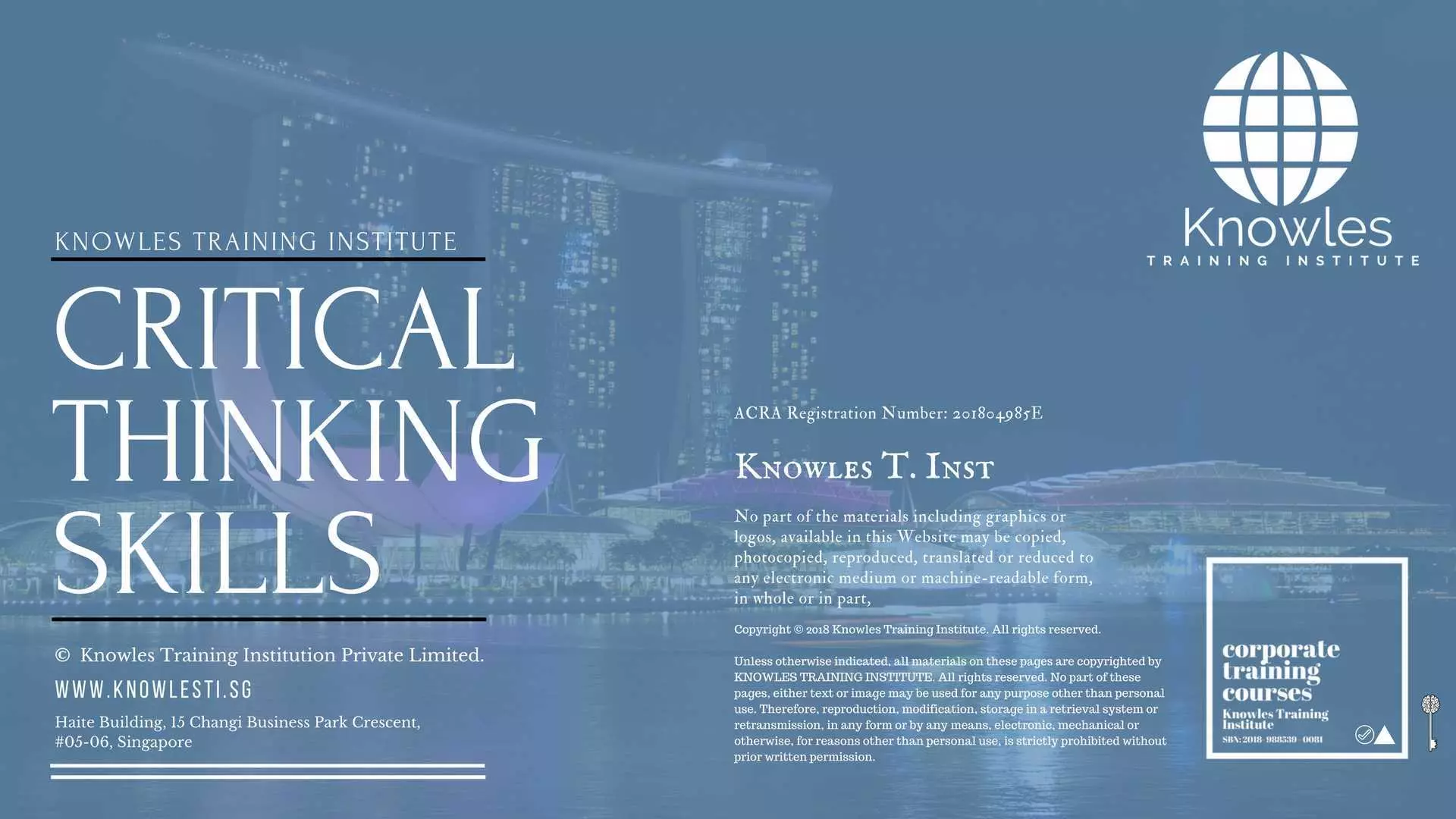
Critical Thinking Skills Course in Singapore
Critical Thinking is a skill most sought-after in an employee. It is more than just being able to think rationally and logically; it also means being able to analyze facts and data to reach a reasonable judgment or opinion. By mastering this skill, employees can make sound decisions and act quickly in problem-solving situations.
We live in a knowledge-based society. Given our exposure to an overwhelming amount of information, Critical Thinking is crucial to digest this information. Critical Thinking gives skills to analyze and evaluate information to absorb the highest amount of knowledge from it. It provides the best chance of making the correct decision and minimizes damages if a mistake does occur.
Critical Thinking will lead to being a rational and disciplined thinker and reduces one’s prejudice and bias. This workshop will provide skills to evaluate, identify, and distinguish between relevant and irrelevant information. It will lead to a more productive career and is an excellent skill for everyday life.
This critical thinking skills workshop is ideal for anyone who would like to gain a strong grasp and improve their critical thinking.
All Staff Within An Organisation
Team Leaders
Secretaries
The ideal group size for this critical thinking skills course is:
Minimum: 5 Participants
Maximum: 15 Participants
The duration of this critical thinking skills workshop is 2 full days. Knowles Training Institute will also be able to contextualised this workshop according to different durations; 3 full days, 1 day, half day, 90 minutes and 60 minutes.
2 Full Days
9 a.m to 5 p.m
Below Is The List Of Course Benefits Of Our Critical Thinking Skills Course
- Learners develop different approaches to a problem and a critical assessment of alternative solutions.
- Develop a comprehensive view of culture and appreciate differences in opinions.
- Critical thinking skills course fosters a creative solution to a problem.
- Development of decision-making skills
- Constructing rational conclusions.
- Increase efficiency and productivity.
- Promote professionalism and fair judgement.
- Develop systematic thinking.
- Minimize making wrong conclusions.
- Boost self-awareness.
- Improve teamwork and perception of different points of view.
- Decrease squabbles over trivial issues.
- Enhance comprehension and learning.
- Improvement of interpersonal relationship.
- Encourage autonomy and self-directed behaviour.
- Promote teamwork and cause positive impacts on a culturally diverse environment.
- Enhancing presentation and communication skills.
Below Is The List Of Course Objectives Of Our Critical Thinking Skills Course
- Understand the components of critical thinking
- Out-of-the-box thinking
- Rational thinking
- Understand what it means to be a critical thinker
- Assess information using critical thinking skills
- Know the benefits of critical thinking
- Revise perspective and viewpoints, when necessary
- Understand problem-solving abilities
Below Is The List Of The Course Content Of Our Critical Thinking Skills Training Course
Critical Thinking Course – Part 1
Critical thinking is akin to the study of logic. Critical thinking relates to how we make decisions and use our judgment. Critical thinking is more than just thinking about thinking or metacognition. It is also about how we take action. Critical thinking involves many components, and we will address several unique components in this part of the course.
- The ability to reason is often regarded as one of the characteristic marks of being human. An individual’s ability to reason well is a critical thinking skill. Numerous definitions of critical thinking tend to focus on the ability to reason.
- Open-mindedness is the virtue by which we study — in particular, staying open-minded means taking into account relevant data or arguments to revise a comprehensive understanding. It means being critically open to options, willing to consider other possibilities even after having reached an opinion, and not letting preconceived notions to stifle or inhibit reflection on newly presented information.
- In critical thinking, the step of analysis assists us to distinguish and access information. Learning transpires in three domains: cognitive, effective, and psychomotor. In the cognitive area, analysis involves the process of discriminating or separating.
Critical Thinking Course – Part 2
As we will cover in the previous part of this course, we can approach critical thinking and problems in a step-by-step fashion. It is called linear or vertical thinking. However, often, we tend not to line up the premises in a normal step-by-step fashion. When we approach a problem in a different order, we are using non-linear thinking. Sometimes, non-linear thinking is also called lateral thinking.
- Logic and conclusion are similar, but not identical. Logic is the branch of philosophy that gives the rules for acquiring valid conclusions. A conclusion is legitimate if it follows from statements that are accepted as facts. For instance, a logical statement might be, 1 + 1 = 2.
- One of the first steps in developing non-linear thinking is to step out of your comfort zone. This concept involves comprehending information or circumstances from a different perspective. A zone is defined as an area set apart in some way.
- An essential step in problem-solving is taking the time to acquire the necessary information. Often, we tend to jump to conclusions before we have all of the facts. How can we use our understanding of logic to gather all the necessary data?
Critical Thinking Course – Part 3
Logical thinking is a process which involves steps. In general logical thinking involves checking the components of the argument and making connections between them, which is what we call reasoning. The four significant steps of logical thinking are 1) asking the right questions, 2) organising data, 3) evaluating the information, and 4) concluding. In this module, we will analyse these necessary steps.
- “Be the change you wish to see,” is a common slogan on bumper stickers. With so many events happening on an international and national level each day, change is simply a standard sequence in businesses. We can always expect changes in organisations.
- The question in today’s culture is not will change occur in an organisation, but how well are employees at adjusting to change. Employees protect themselves from becoming obsolete by changing. Adaptation is a survival skill of nature
- The first step in logical thinking should commence by asking the right questions. Based on the components of critical thinking, logical thinker should start reasoning by asking many questions. A vital question to ask is “What are the premises?”
Critical Thinking Course – Part 4
- Organising data is the second step in the Logic process. Once we know the premises, we can begin to arrange the data. We can organise the information by making connections.
- After organising the information, the logical thinker can proceed with evaluating it. Evaluating information involves determining whether the information is valid. Conclusions cannot be made until a distinction is made between truth and validity.
- Once the data has been collected, organised, and evaluated, we can then conclude. Recall that in deductive reasoning, conclusions are gathered based on valid premises. In inductive reasoning, we use observations to draw conclusions or a hypothesis.
Critical Thinking Course – Part 5
- We have all heard it before the best communicators are active listeners. What does it mean to practice active listening? Active listening suggests the listener is completely engaged in what the speaker is communicating and judging what is being said.
- Curiosity is yet another skill in improving critical thinking. Some scholars maintain that Socrates ultimate goal was not so much to advocate his methods, but to advocate self-improvement and to spark curiosity. The primary purpose of a teacher is to spark interest and engage their students.
- Reasoning and rationale are often correlated with self-discipline. Critical thinking is a self-disciplined and self-guided action. Critical thinking compels the individual to use their reasoning skills and have the ability to evaluate and reflect.
Critical Thinking Course – Part 6
- Humility is defined as the “essence of being modest of opinion or estimate of one’s importance. ” Humility is the contrast of arrogance. Humility relates to having an open mind.
- One of the principal functions of thinking is to create connections. Our ideas gain significance when we can relate or connect them to other concepts. We start to attain insight when we see the similarities between ideas.
- Objectivity is defined as “intentness on objects external to the mind.” In critical thinking, we strive to have an acute understanding of objectivity. Objectivity is a heuristic or rule/approach for problem-solving.
Critical Thinking Course – Part 7
- As suggested in the previous section, emotions should not be disregarded altogether when thinking critically. Emotions play a significant role in the thinking process. For example, professionals need empathy when working with others regardless of their occupation to vicariously experience what others feel, believe, or wish.
- Self-awareness is a characteristic of a Critical Thinker. This is to acutely be aware of one’s feelings, opinions, and assumptions. Moreover, it is an origin point for thinking critically.
- As we mentioned in the previous module, self-awareness is a starting point from which we commence to think critically. We based our choices on assumptions we get about objects or things. Assumptions are the arguments, but the distinctive feature of a hypothesis is that it is a declaration in which no proof or evidence is provided.
Critical Thinking Course – Part 8
- As we learned in the section on logic, confirmation bias can impact the inferences we draw. Bias is not something that we can eliminate. However, when thinking critically, we need to watch out for confirmation bias.
- As we discussed in an earlier section, asking the right questions is essential. Equally important is to ask clarifying inquiries when making decisions. Clarifying questions are thought-provoking questions to obtain more information.
- SWOT Analysis is also called Strengths, Weaknesses, Opportunities, and Threats. We use this type of analysis to be more objective thinkers. SWOT allows us to think clearly and clearly, and from a rational point of view.
Critical Thinking Course – Part 9
- Persuasiveness is the characteristic of being capable of influencing others. We usually think of salespersons and politicians when we hear the word persuasiveness. However, all managers or professionals use persuasiveness daily.
- Critical thinking improves communication for some of the same reasons that it improves persuasiveness. Many of the same factors we use to improve our persuasiveness also make us better communicators in general. For example, the use of analogies and metaphors are a great persuasion and general communication technique.
- Critical thinking and problem-solving are closely related and are almost intertwined. Sometimes we say that to solve logic problems; we must use our critical thinking skills. Logic, critical thinking, and problem-solving use some of the same cognitive processes.
Critical Thinking Course – Part 10
- What is emotional intelligence and how does critical thinking aid increase our emotional intelligence? Emotional intelligence is identified as the capacity to assess and control the emotions of oneself, others, and even groups. Emotional intelligence is being “heart smart” as opposed to “book smart.”
- As discussed at the beginning of this course, one element of critical thinking is open-mindedness. This component, as well as bias, relate to the critical thinkers’ point of view. The less open-minded and more biased a person is, the more limited their point of view.
- One reason we find it so tough to consider other’s viewpoint is that we are over-concerned with our own opinions and views. A challenge for the critical thinker is to step down from the “mountain of self”, and climb up the “mountain of the other”. Considering another viewpoint is more comfortable when we know the benefits.
Critical Thinking Course – Part 11
- In this course, we have discussed bias and how it influences our conclusions in the logic process. What are some influences on the bias? The first thing that can influence bias is the way the person interprets the information he or she is receiving.
- When the critical thinker receives new information, how should they organise it? Probably the most common way of handling new information is through an organisation schema. Schemas indicate which further role information plays.
- Much of critical thinking is about how to connect the two points in a problem. However, sometimes, critical thinkers are presented with inconsistencies or what scientists call cognitive dissonance. Cognitive dissonance can emerge through a discrepancy between attitude and beliefs. Inconsistencies can also be called variances or dissimilarities.
Critical Thinking Course – Part 12
- “Trust your instincts” comes under the second stage of problem-solving, and you should now start to see solution paths. Instincts are defined as a natural intuitive power. Intuition or instincts are vital pieces in problem-solving.
- In an earlier module, we discussed how asking the correct question is essential in logical thinking. Asking why is equally important in problem-solving. It is not sufficient to be bestowed with the information or data.
- Once a possible solution has been acquired, problem solvers may believe they can proceed with the answer. However, they should not overlook the all-important step of evaluating all possible solutions. Sometimes, one problem has more than one solution and taking the time to assess the efficacy of each alternative is a critical thinking skill.
Critical Thinking Course – Part 13
- Now that we have learned many new critical thinking skills, our next challenge is to retain these skills. There are many methods to help you retain your new critical thinking skills. Developing a schema for organising and remembering information is one method.
- Reflection is a useful step in the logic process. Reflecting and learning from mistakes is also helpful in critical thinking. You may not be able to reflect every time you engage your critical thinking skills.
- The importance of inquisitiveness cannot be overemphasised in the process of critical thinking. One contribution to civilisation that Socrates made was that he advocated the questioning process during a debate. Furthermore, learning is a process sparked by the wish to know more.
- The best way to enhance your critical thinking skills is to practice. Develop ways to remember and organise the techniques from this course. Develop a schema.
Each participant will receive the following materials for the Critical Thinking Skills course
Critical thinking skills learner’s guide.
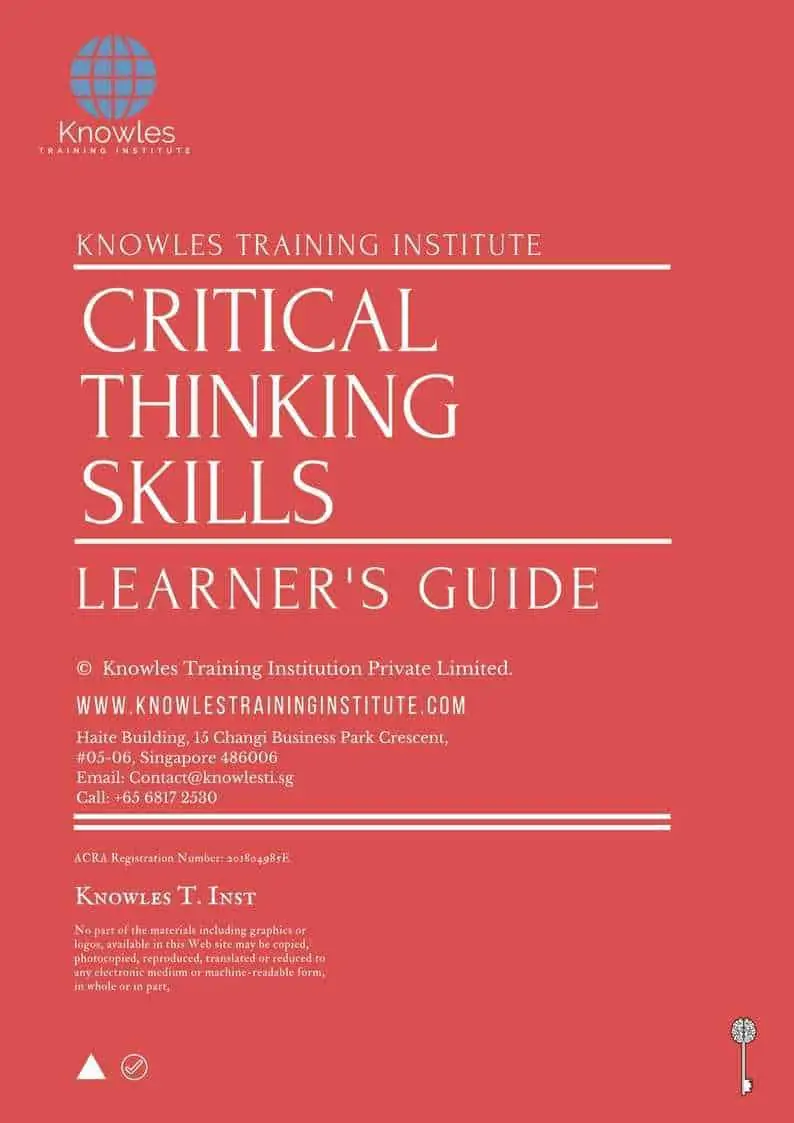
Critical Thinking Skills Key Takeaways Notes
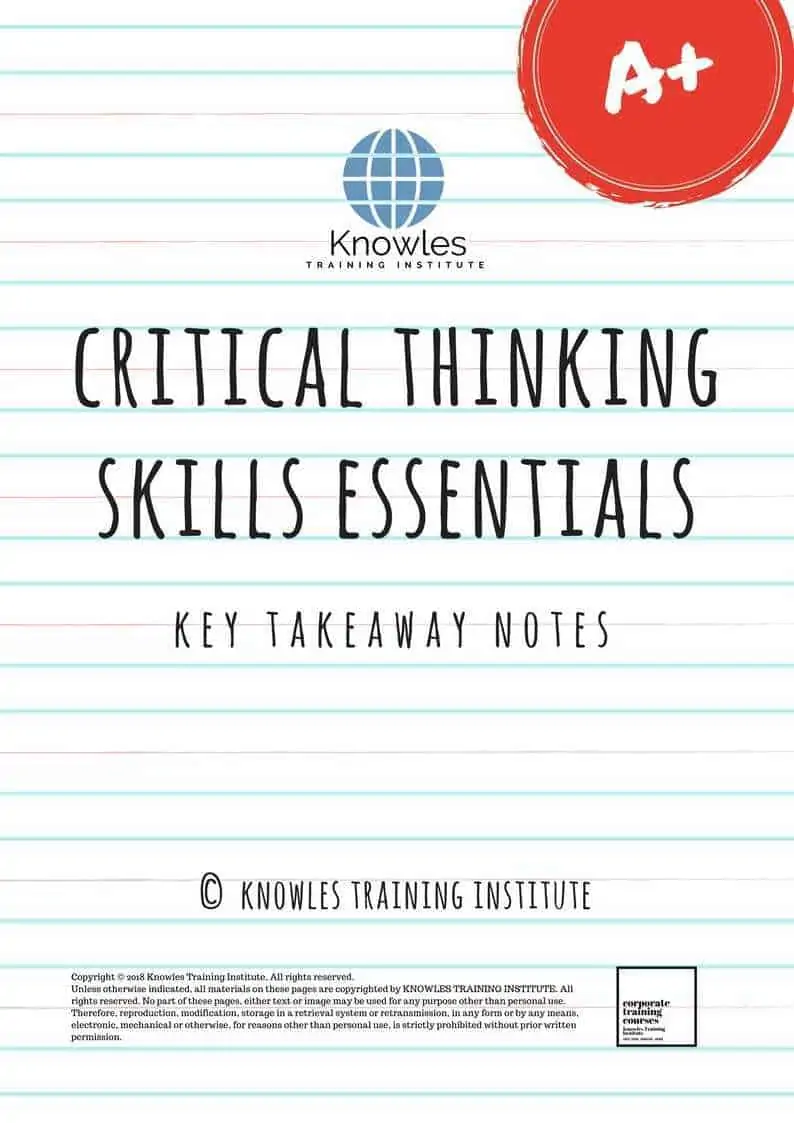
Critical Thinking Skills Essentials Ebook
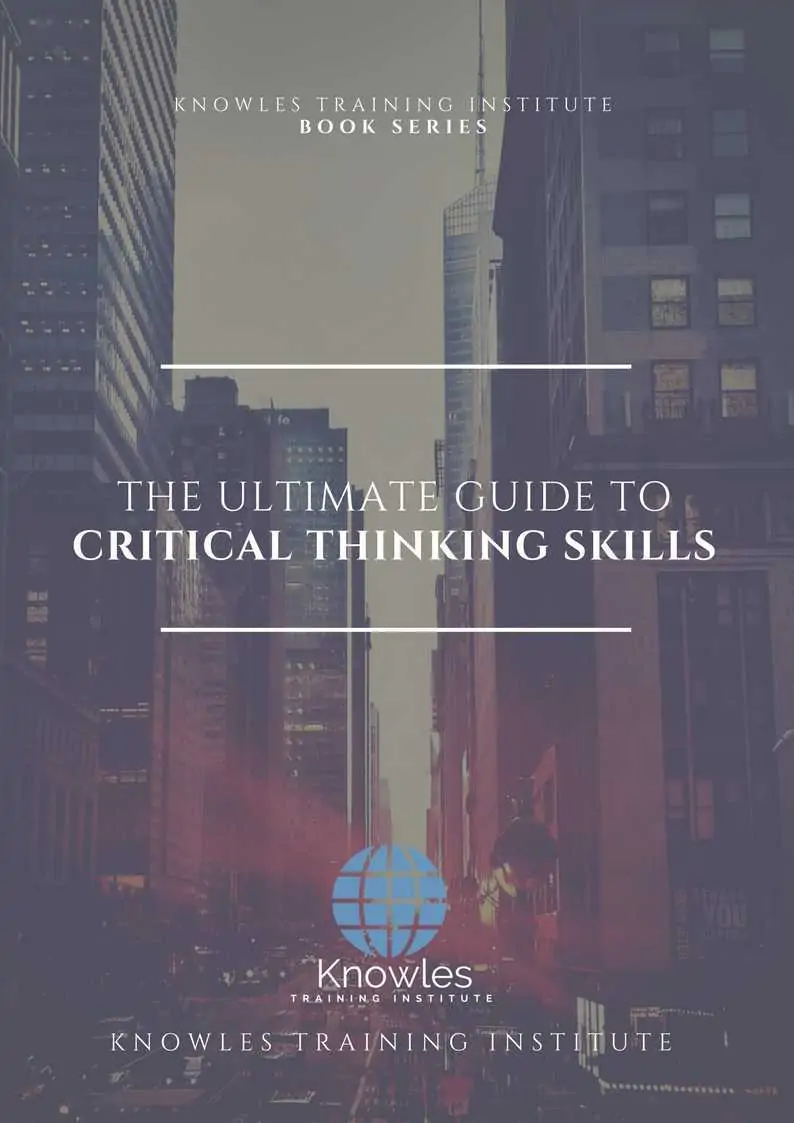
Critical Thinking Skills Course Handouts

Critical Thinking Skills 30-Day Action Plan

Critical Thinking Skills MindMaps Pack

Critical Thinking Skills PPT Slides Used During Course

Critical Thinking Skills Long-Term Memory Flashcards Pack

Critical Thinking Skills E-Learning Course
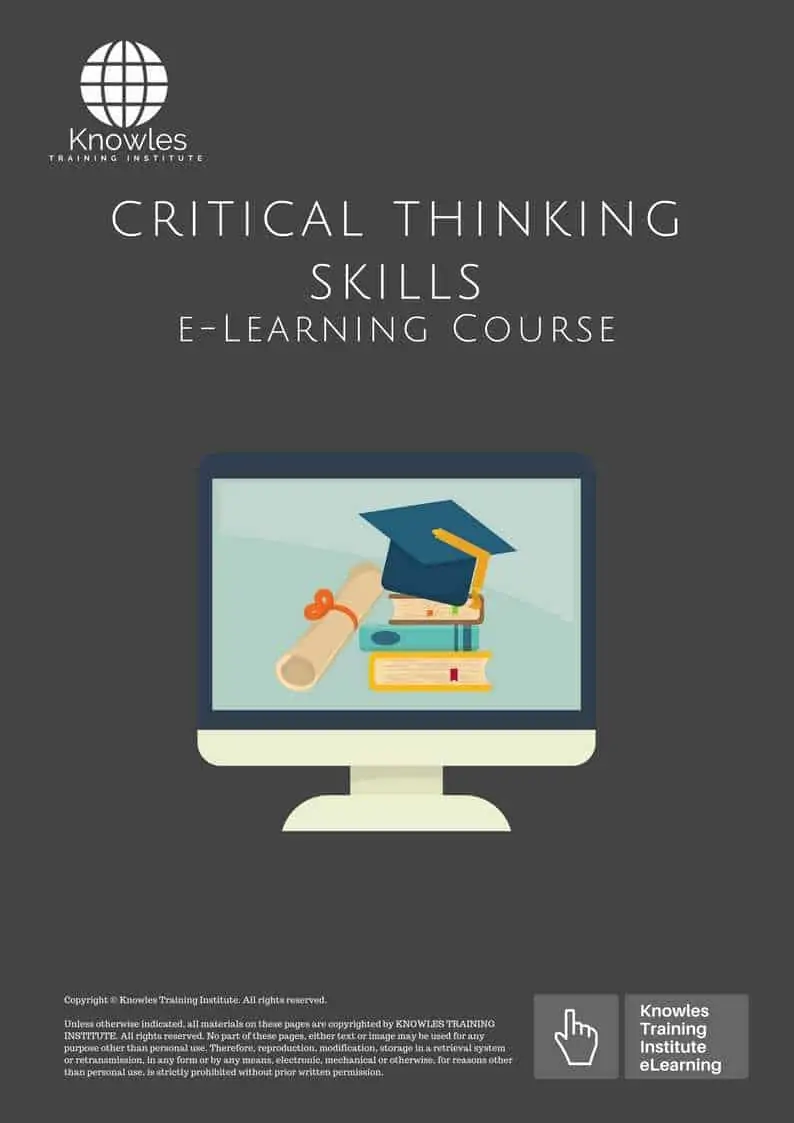
Critical Thinking Skills Online Video Course

Critical Thinking Skills Essentials Audiobook

Critical Thinking Skills Infographics Pack
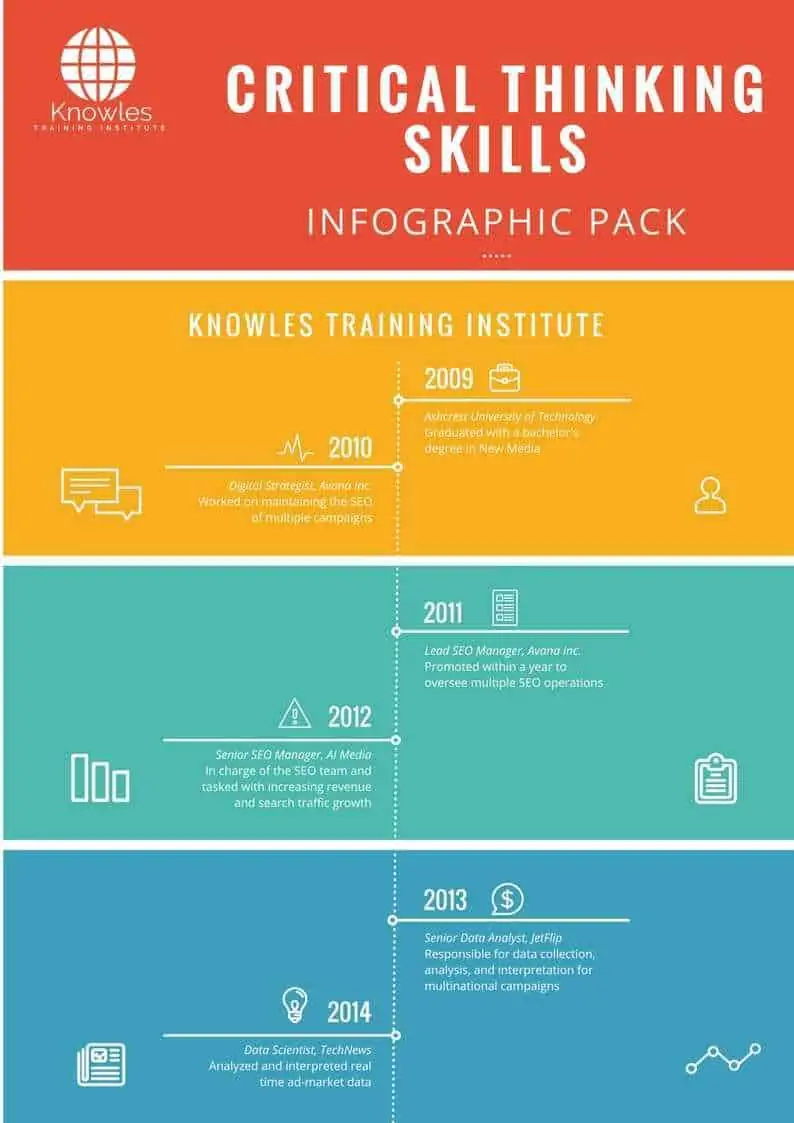
Each course participant will receive a certification of training completion
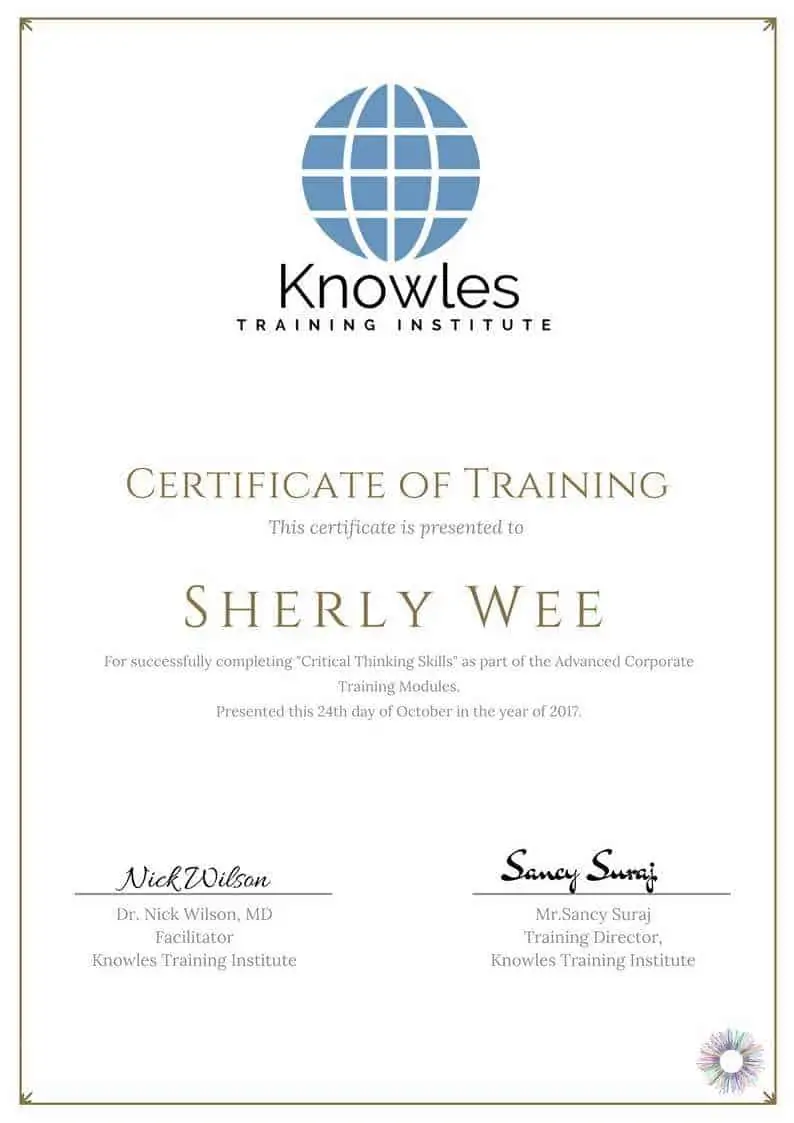
There are 4 pricing options available for this Critical Thinking Skills training course. Course participants not in Singapore may choose to sign up for our online Critical Thinking Skills training course.
- SGD 1,334.96 For a 60-minute Lunch Talk Session.
- SGD 584.96 For a Half Day Course Per Participant.
- SGD 884.96 For a 1 Day Course Per Participant.
- SGD 1,184.96 For a 2 Day Course Per Participant.
Discounts available for more than 2 participants.
Contact us for the latest Critical Thinking Skills course schedules:
Phone: +65 6714 6663
Email: [email protected]
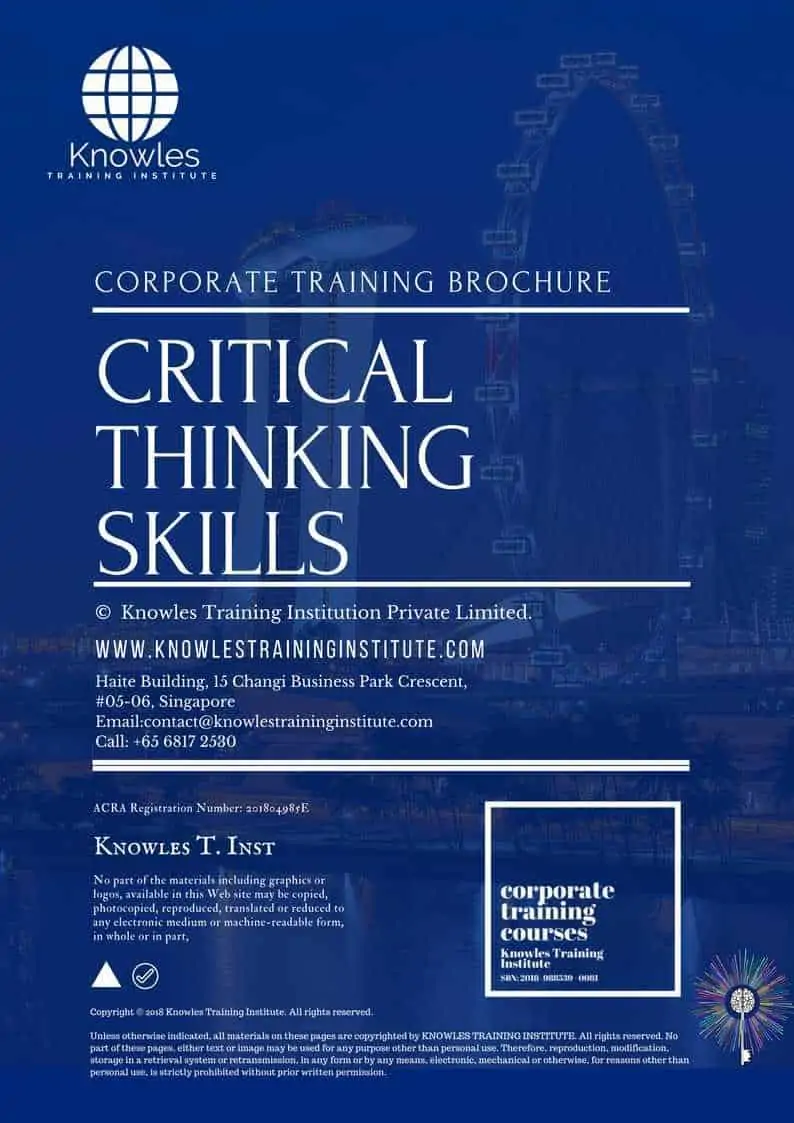
Request for this Critical Thinking Skills course brochure. Fill up the short information below and we will send it to you right away!
Post-Training Support: A vast majority of training does not have any effect beyond 120 days. But to work, training has to have a strong pre- and post-training component. Post-training reinforcement consequently helps individuals to recall the understanding and ask questions.
Blended Learning: Learning does not occur in the classroom. Virtually everybody prefers distinct ways of learning. Successful learning should have a multi-channel, multi-modal strategy.
We Understand The Industry: Similarly, we’ve got a profound comprehension of the business, business design, challenges, strategy and the that our participants are in and have designed the courseware to cater to their professional needs.
Course Content: Knowles Training Institute’s material is relevant, of high quality and provide specific learning outputs. As a result, Participants will leave the training course feeling as they have gained a strong understanding and will also be in a position to execute what they have learned sensibly.
Course Development — The workshop modules follow a systematic and logical arrangement. Therefore, this structure helps to ensure that the course material allows the facilitators to deliver the course in a logical arrangement. Consider the subjects as building bricks into learning, our facilitators slowly build towards a comprehensive picture of this entire topic.
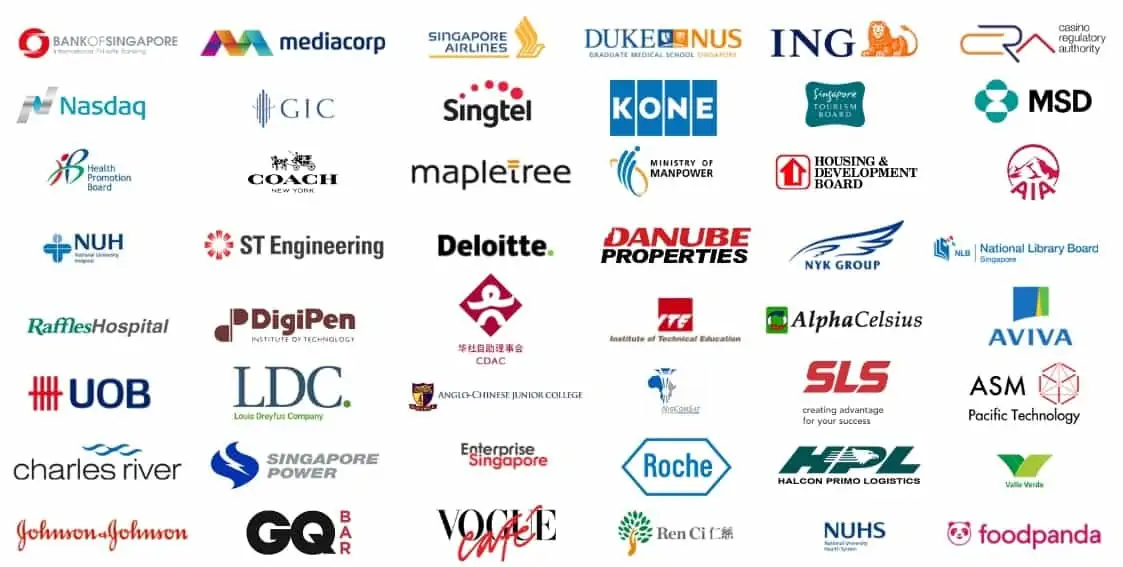
Fill up the form and we will get back to you in less than 1 working day.
Alternatively, give us a call to have one of our training consultants contact you. Our corporate training courses can be contextualized to meet your organization’s training needs. Leverage on our large pool of professional trainers and consultants for your organization’s training needs.
Office Address: 60 Paya Lebar Rd, #07-54 Paya Lebar Square, Singapore 409051
Office Phone: +65 6714 6663
Email: [email protected]
What are the 5 critical thinking skills?
What does it mean to think critically, what are examples of critical thinking, what are some characteristics or traits of a critical thinker, what is the goal of critical thinking, what are the types of thinking, why are critical thinking skills important, what is opposite of critical thinking, what are the traits of critical thinking, what are the principles of critical thinking, how can i improve my critical thinking skills, what are the barriers to critical thinking, can critical thinking be taught, how do you read critically, what are the qualities of a critical thinker, what are some critical thinking skills to master, what are some elements of critical thinking, what do good thinkers do, who are the best critical thinkers, register for this critical thinking skills course now, share this critical thinking skills training course, https://plato.stanford.edu/entries/critical-thinking/, critical thinking courses. critical thinking courses singapore. ctitical thinking courses in singapore. singapore critical thinking courses. best critical thinking skills course, workshop, training, class, seminar, talk, program, programme, activity, lecture. the best critical thinking skills courses, workshops, classes, seminars, talks, programs, programmes, activities, lectures in singapore. effective critical thinking skills improvement tips, critical thinking skills techniques, improve critical thinking skills, improve critical thinking skills games, critical thinking skills improvement exercises, improve critical thinking skills power, how to have good critical thinking skills, how to have good critical thinking skills in studying, how to build up your critical thinking skills, how to improve critical thinking skills how to improve critical thinking skills course in singapore. enhance, boost, build up, enlarge, heighten critical thinking skills course in singapore. increase, intensify, raise, reinforce, strengthen critical thinking skills. upgrade, amplify, boom, elevate, exaggerate, magnify, grow, gain critical thinking skills. develop critical thinking skills, multiple, power up, beef up, bolster, establish, extend critical thinking skills. invigorate, restore, step up, toughen, empower, fortify, regenerate critical thinking skills. rejuvenate, renew, escalate, expand, maximize critical thinking skills. powerful, mighty, impressive, competent, great, excellent, exceptional critical thinking skills in singapore. superb critical thinking skills. super, superior, strong, solid, active critical thinking skills training courses and workshops in singapore. productive critical thinking skills enhancement, booster, building up, enlargement, heightening, increment, strengthening, amplification. online critical thinking skills magnification, growth, development, power, empowerment, regeneration. virtual critical thinking skills rejuvenation, development, escalation, expansion. constructive critical thinking skills maximization, power training courses & workshops in singapore., corporate training courses in singapore.

Terms and Conditions: 1. Valid for 30 Days Only, 2. 1 Person Only, 3. Selected Courses Only, 4. General Terms and Conditions Applied*

IMAGES
VIDEO
COMMENTS
Programme leader. An independent corporate trainer-consultant, Lim How is a recognized expert in the fields of critical thinking, transformational leadership, human relations, and the related. A psychologist by training at Yale University, his expertise has been regularly sought after by various Fortune 500 companies such as Citibank, Du Pont, and IBM, to list a few.
Critical thinking, therefore, is becoming an in-demand skill, but is also one that is commonly missing. ... Trainees must be hired in accordance with the Employment Act and fully sponsored by their employers for the course; Trainees must be Singapore Citizens or Singapore Permanent Residents;
Key critical thinking skills to have in the workplace include perspective-taking, analysis, evaluation, inference, and synthesis leading to effective communication and problem-solving. This course is designed to achieve several learning outcomes which include fostering a collaborative environment where different perspectives and possibilities ...
Unlock the power of critical thinking! Our course teaches you how to make informed decisions, solve problems decisively, and improve communication in the workplace. ... (ACTA) with the Singapore Training & Development Association (STADA), the training division of the Singapore Workforce Development Agency (WDA). He is a Certified Behavioural ...
To be successful in the New Age, we need to adopt New Thinking: The 'Essential Thinking Traits for the Digital Age. These thinking traits are powered by a combination of Lean Thinking, Design Thinking, Agile and other cutting-edge management and innovation approaches. This module is available on a standalone basis.
Course Description. Our 'Critical Thinking for Problem Solving' course at ASK Training will teach you the true essence of critical thinking and train you to fully foster your skills to solve relevant workplace problems, as well as communicate solutions effectively.This course helps you develop your own critical thinking style by introducing a variety of thinking styles you can use to your ...
Aventis provides Critical Thinking Skills: Think Creatively and Solve Problems Decisively Course in Singapore. Get Discount when you order with a Group of 3. Download Training Directory (2025)
His passion is in the fields of leadership, critical thinking, operations and management. His seminars and workshops are fun, interactive and designed to maximise learning retention. Raymond is also the Immediate Past President (2015-16) and professional member of the Asia Professional Speakers Singapore (APSS).
Critical Thinking Course Singapore - Creativity, Innovation and Thinking. PROGRAM OVERVIEW "Think critically!" is a common exhortation Singaporeans are challenged with. Given the fast pace of change, the quality of our thoughts are vital in addressing complex challenges that change brings about.
Critical Thinking Skills Course in Singapore. Critical Thinking is a skill most sought-after in an employee. It is more than just being able to think rationally and logically; it also means being able to analyze facts and data to reach a reasonable judgment or opinion. By mastering this skill, employees can make sound decisions and act quickly ...